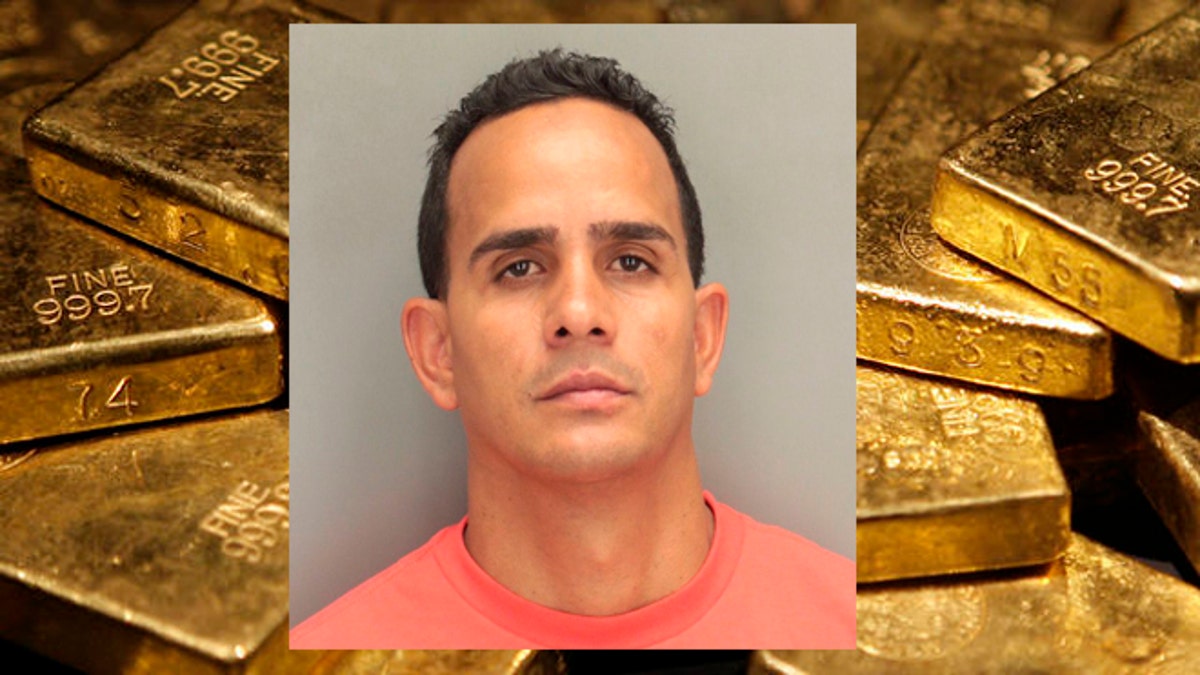
Raonel Valdez skipped bail in Miami following a $2.8 million gold heist and is now believed to be either in the Bahamas or somewhere in South Florida. (AP Photo/Seth Wenig, File)
It looks like Raonel Valdez may once again escape the long arm of the law.
The Cuban fugitive, wanted in the United States for allegedly participating in a $2.8 million gold heist, avoided stiff jail time while carrying out a series of bold crimes in the U.S. before fleeing into the Caribbean on a stolen 30-foot speedboat in December 2012. Valdez was picked up by local authorities at Belize’s border with Guatemala earlier this year. Since then, he has been held at Hattieville Prison in Belize City while awaiting extradition to the U.S.
The problem, however, is that two federal agencies can’t seem to agree whether or not Valdez should be brought to justice here.
The U.S. Marshals Service, who took the lead in the investigation after Valdez fled the country, wants the fugitive shipped back to Florida, but officials at the Department of Homeland Security have yet to sign Valdez’s parole letter permitting a suspected criminal to be brought into the country.
“The Marshals Service used many domestic and international investigative resources to locate Valdez ultimately in Belize and has requested that DHS' Homeland Security Investigations approve parole of Valdez back into the U.S. to face justice in the alleged armed robbery case,” Drew Wade, a spokesperson for the Marshals Service said in a statement to Fox News Latino.
Immigration and Customs Enforcement, who is handling the matter as part of the DHS, acknowledged that it has received the request and was reviewing the situation, but gave no answer for the delay on why the agency has not singed the parole letter for Valdez.
“U.S. Immigration and Customs Enforcement (ICE) Homeland Security Investigations has received the request and has not made a decision," Barbara Gonzalez, a spokesperson for ICE, told FNL in an email. "ICE is currently working with the U.S. Marshals Service and ICE is reviewing the request."
The seemingly counterproductive work between the two federal agencies is common in law enforcement, Tom Raffanello, a former Drug Enforcement Administration agent and current private investigator told FNL.
“It’s just part of the overall normal malady in law enforcement bureaucracy today,” he said. “It’s all politics.”
The office of U.S. Rep. Ileana Ros-Lehtinen (R-Fla.) told FNL that it had already contacted both the DHS and the State Department to get information about Valdez's case but had not received any word on what was causing the delay in his parole letter.
"We're looking for answers," Debbie Zimmerman, the congresswoman's district chief of staff told FNL. "They've got a reason why they're delaying this issue right now, but we're not sure what it is."
Valdez came to the U.S. in 2005, quickly obtaining a Social Security card and driver’s license in Florida thanks to the Cuban Adjustment Act, which grants undocumented immigrants from the island who reach U.S. soil nearly-guaranteed legal status. Soon afterward, Valdez began a career in crime.
He earned his first criminal charge in June 2007 when he was busted for possession of marijuana.
He was soon paroled and, the next year, cops found 85 grams of methamphetamine under the hood of his car. In July 2008, Valdez was arrested again. This time for aggravated assault with a deadly weapon for attacking security guards while trying to steal an $18 pair of garden shears Home Depot.
Valdez then jumped his bail and fled to Mexico, where he soon ran afoul of authorities and was arrested on charges of human smuggling for taking people from Cuba to Mexico.
After he was recruited by the U.S. Drug Enforcement Administration to help kidnap a high-ranking Zetas drug cartel member – an attempt that failed because they wound up netting the wrong guy. Valdez wound up back in Miami where U.S. Customs and Border Protection arrested him at Miami International Airport for missing a 2008 court date.
While Florida Judge Victoria Brennan let him walk free for time served, Valdez soon racked a string of offenses in the next year, including another drug possession charge for operating a Miami marijuana growing operation, abusing the mother of his 2-year-old daughter and getting slapped with a felony armed robbery charge that earned him a GPS tracker.
Then came the armed gold heist that netted 110 pounds of gold flakes – valued at nearly $3 million – from an unsuspecting, sickly courier, George Villegas, who was on his way to deliver the precious metals to a refinery.
A GPS tracker on his ankle showed Valdez casing an apartment complex where he allegedly swiped the gold off of Villegas. It showed when he entered the building and followed him for five days afterward as he peddled the gold to various pawn shops in Miami-Dade County and bought a girlfriend a 2008 Toyota Yaris, before the signal from the ankle monitor went dead, and Valdez disappeared from the map.
With Valdez now back on the map and sitting in a jail in Belize, the decision on whether he will go on trial in the U.S. or serve out the remainder of his six month immigration sentence in Central America rests on the shoulders of officials in Washington.
“The Marshals don’t have a dog in the fight right now,” Raffanello said. “Right now it all depends if somebody higher up calls DHS and put the pressure on them.”








































